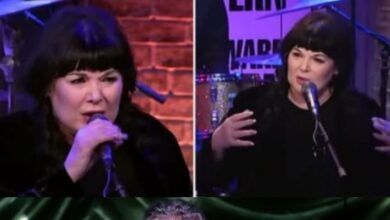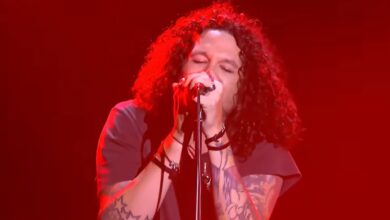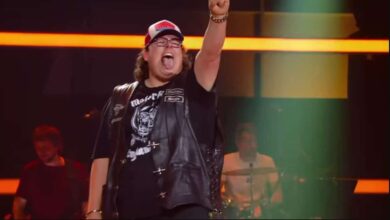The Last Song: Inside Johnny Cash’s Emotional Farewell at Carter Family Fold
Johnny Cash’s last appearance on stage, held on July 5, 2003, at the Carter Family Fold in Hiltons, Virginia, was an unforgettable farewell steeped in emotion and reflection. Just weeks away from his death and confined to a wheelchair, Cash still found the strength to deliver a deeply intimate 30-minute set. Though visibly weakened, his presence carried a quiet strength that left the audience both heartbroken and awestruck.
The songs chosen for the evening weren’t just a setlist—they were pages from his life. Cash performed fan favorites like “Folsom Prison Blues,” “I Walk the Line,” and “Big River,” alongside more introspective selections like “Sunday Mornin’ Comin’ Down” and “Angel Band.” These were not just renditions—they were farewells, each word heavy with the weight of memory, pain, and enduring love.
Perhaps the most devastatingly tender moment came when Cash introduced “Ring of Fire,” dedicating it to his beloved June Carter Cash, who had died only weeks earlier. His voice trembled slightly as he spoke of her presence still lingering with him, offering comfort. That small act—publicly remembering her—turned the song into a eulogy, casting a quiet spell over the audience.
Despite the toll of age and illness, his voice remained unmistakably Johnny Cash. The gravelly tones may have been slower, the phrasing more deliberate, but the soul behind the sound had not dimmed. Supported by guitarist Jerry Hensley and bassist Bobby Starnes, Cash’s performance had a stripped-down simplicity that only amplified the emotional gravity of the moment.
The audience in Hiltons was not just there for a concert—they were witnessing history. The modest setting of the Carter Family Fold, steeped in Appalachian musical heritage, was the perfect backdrop for this closing chapter. As each lyric echoed through the wooden walls, listeners held their breath, sensing they were part of something sacred, something final.
The significance of the venue can’t be overstated. The Carter Family Fold, created to preserve the legacy of the original Carter Family, was more than just a stage—it was home. This connection brought Cash’s career full circle, ending where so much of it had begun, and adding a rich layer of symbolism to the performance.
Cash’s life had been a tapestry of highs and lows—global fame, addiction, personal loss, spiritual awakening. Each of those elements was present that night. You could hear the weight of past battles in his voice, but also the peace that comes with resolution. The man on stage was not seeking applause—he was seeking closure.
Born in Kingsland, Arkansas, on February 26, 1932, Johnny Cash’s life was one of transformation and rebellion. From rockabilly roots to prison performances and gospel odes, he moved fluidly through genres and generations. And even at the very end, his devotion to performing—to telling stories in three-minute bursts of truth—never wavered.
Cash had always sung from the heart, but that night, it felt like he was singing from his soul. The death of June had clearly hollowed him, yet the courage he summoned to sing in her memory was both painful and beautiful. His quiet strength resonated more powerfully than any roaring finale ever could.
The set was humble, the audience small, and the stage bare—but the impact was enormous. This wasn’t the grand sendoff of a global superstar; it was something more personal. It was a man whispering goodbye, not just to music but to the life that gave it shape.
Johnny Cash’s music had always reached into the darkest parts of life—sorrow, guilt, redemption—and found something honest to say. His final show was no different. In his weathered face and trembling voice, he reminded us of what it means to keep going, to keep singing, even when the end is near.
That night, the applause wasn’t deafening, but it was deep. Every clap seemed to carry gratitude—for the music, for the honesty, for the years. No pyrotechnics, no spectacle. Just a man, a guitar, and a goodbye that echoed far beyond the mountains of Virginia.
The legacy of that performance isn’t just in the notes he sang—it’s in the courage he showed. It lives in the silence between songs, the looks exchanged with the band, the pause before his final bow. In those moments, Johnny Cash gave everything he had left. And that, more than anything, is what people remember.
In a world that often celebrates the loudest exit, Cash reminded us that the quietest goodbyes can be the most powerful. His final performance remains a masterclass in vulnerability, resilience, and undying love. It was more than music—it was the soul of a man, shared one last time.





